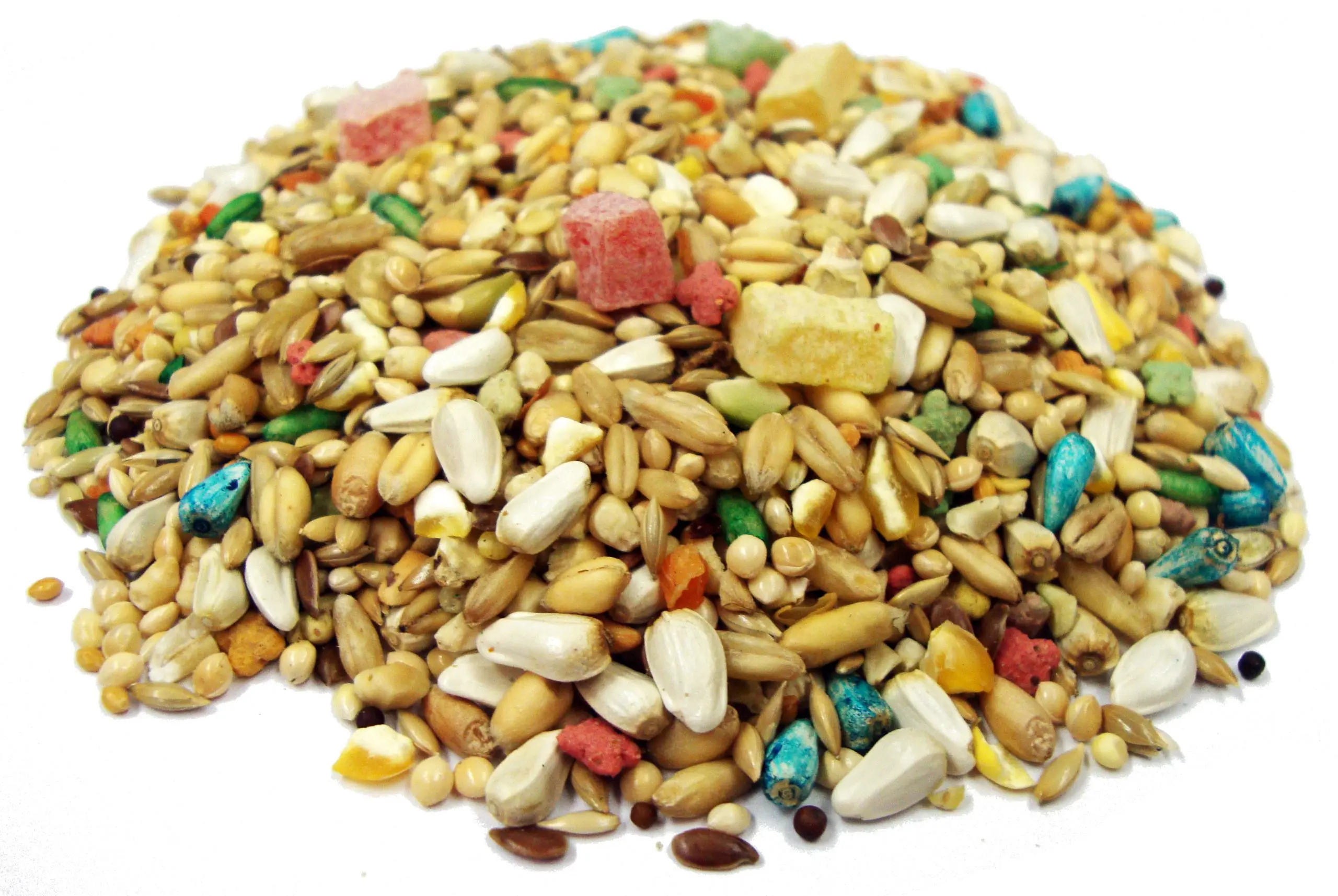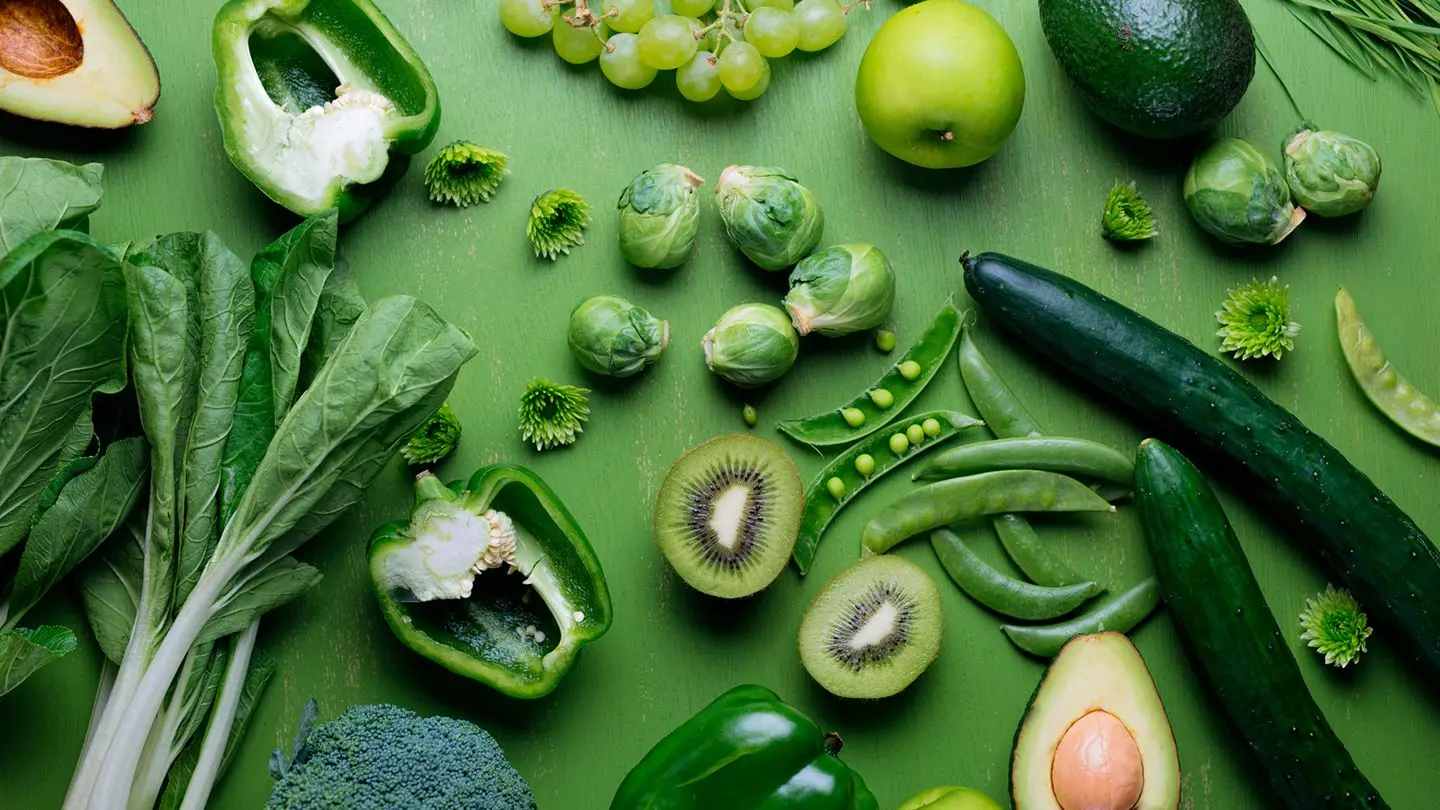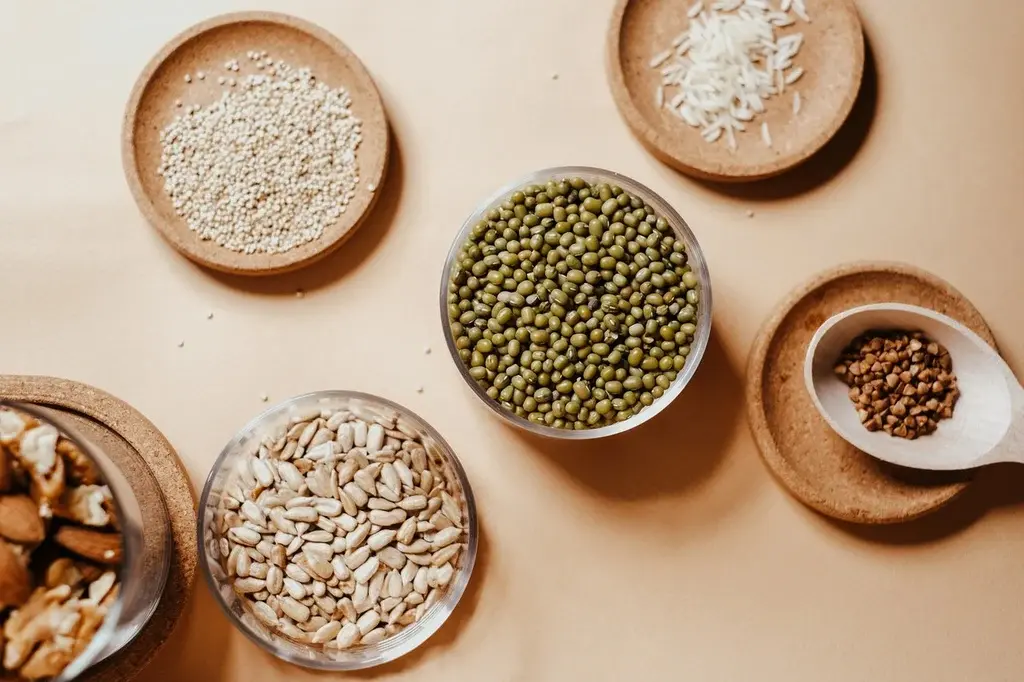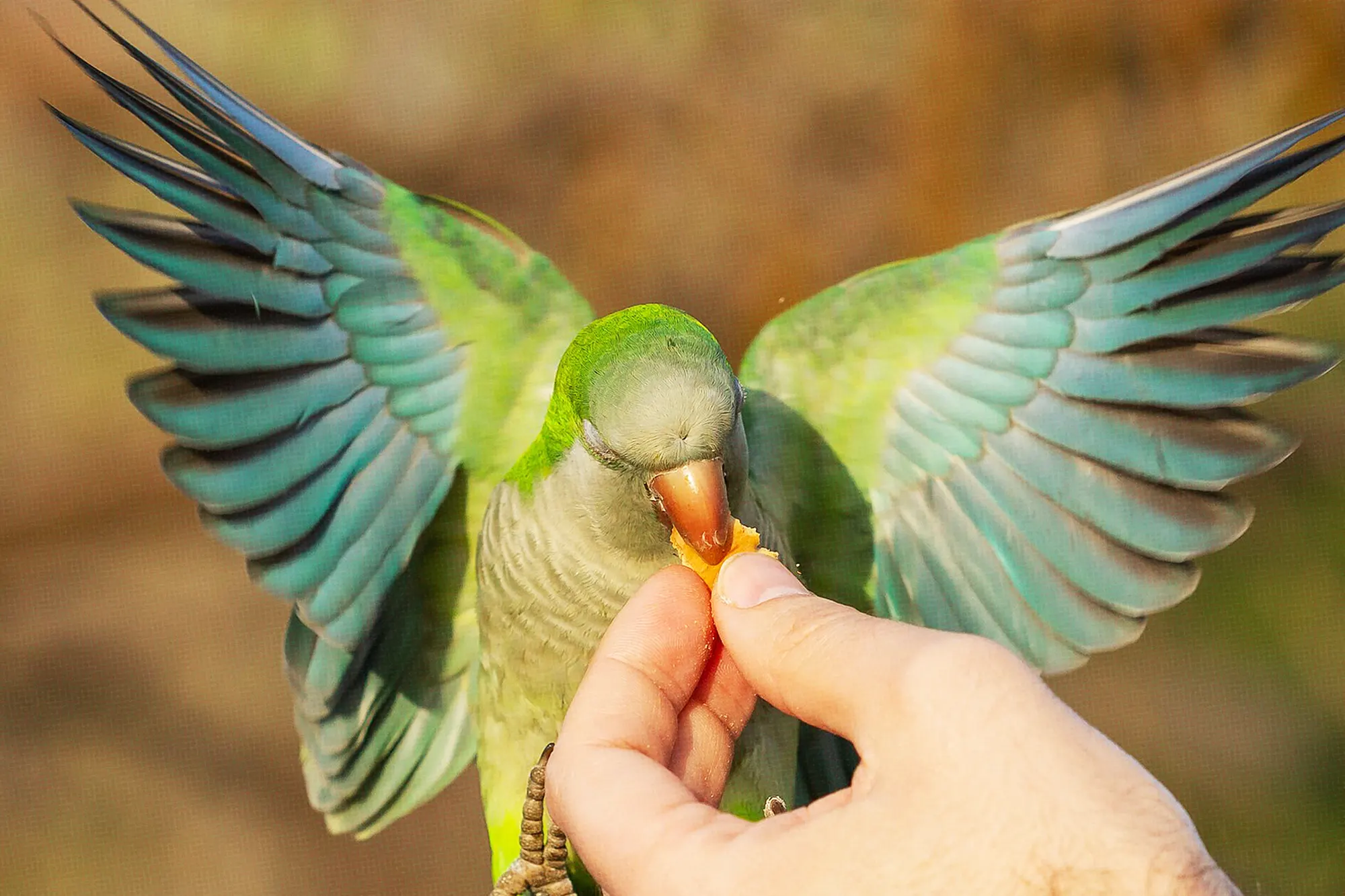Parakeets are lively, intelligent birds that make wonderful pets. With their exuberant chirps, colorful plumage, and inquisitive personalities, it’s no wonder parakeets are one of the most popular pet birds today. But what should my parakeet eat? Let’s find out.
Like us, parakeets thrive on a nutritious, balanced diet. In the wild, parakeets eat a diverse mix of seeds, fruits, veggies, nuts, and the occasional insect or insect larva. As pet owners, it is our responsibility to recreate this varied diet as much as possible. The right foods will keep your parakeet healthy, happy, and full of energy. This comprehensive guide will walk you through everything you need to know about your parakeet’s dietary needs — we’ll discuss the different food groups they should be eating, proper daily portions, vital nutrients they require, healthy treat options, and more.
The Basic Diet of a Parakeet

In the wild, parakeets (or budgies for our fancy friends) spend their days munching on seeds, fruits, vegetables, and insects. Just like how we humans can’t survive on pizza alone (no matter how tempting), it’s essential that our birds enjoy a varied diet to keep them chirping with joy.
Nutrients Required For A Healthy Parakeet
Just as we humans need a balanced diet filled with essential nutrients to keep us healthy, parakeets also require a mix of vital nutrients to keep them chirping with joy — from proteins, to carbohydrates and fat.
1. Protein
As the building blocks of life, proteins play a starring role in your parakeet’s well-being by supporting growth, repair, and maintenance of virtually all body tissues. So keep an eye on protein-rich sources like:
- Sprouted seeds: By sprouting the seeds, you’re unlocking their protein power and providing your bird with a tasty, nutritious treat. Watch your parakeet sing your praises as they happily peck away.
- Legumes: Cooked lentils, beans, and peas pack a punch of protein and an added bonus of vitamins. Mix them with your bird’s other food offerings for an all-star mealtime spread.
- Insect treats: You might squirm, but your parakeet will rejoice at the sight of an occasional cricket or mealworm. High in protein, insects make for nibble-worthy treats.
2. Fats
Fats are like your parakeet’s personal energy bank, providing insulation, energy storage, and cushioning for internal organs. But balance is key, as too much fat in their diet can lead to obesity. Opt for healthier fat sources like:
- Seeds (in moderation): While seeds are a great source of essential fatty acids for your parakeet, it’s crucial not to overdo it. Remember to balance seeds with pellets, fruits, and veggies.
- Nuts: Nuts like almonds and walnuts provide healthy fats, as well as other nutrients. Feed sparingly to ensure your parakeet doesn’t tip the scales toward chubbiness.
3. Carbohydrates
Parakeets need a balanced diet containing carbohydrates for energy. In the wild, parakeets get most of their carbohydrates from fruits, berries, veggies, seeds, and nuts. As pets, they should be offered a variety of healthy carb sources including:
- Pellets and fortified seeds: Look for a brand made specifically for parakeets that contains fruits, veggies, and whole grains. This ensures your parakeet gets carbs and other key nutrients.
- Cooked whole grains: Birds can eat small amounts of cooked brown rice, quinoa, couscous, and whole wheat pasta. Make sure they’re fully cooled first.
- Unsweetened cereal: Low-sugar “human” cereals like bran flakes or Cheerios make an occasional carb-rich treat. Just a few pieces once or twice a week.
- Chopped fruits and veggies: Parakeets enjoy biting into fresh foods. Try feeding tiny pieces of apple, melon, berries, sweet potato, and broccoli.
4. Vitamins and Minerals
Vitamins and minerals ensure proper body functions, immunity, and overall health in your parakeet.
- Calcium: Critical for bone health and egg formation, calcium can be found in dark leafy greens and cuttlebones. Make sure your parakeet gets their dose of this essential mineral.
- Vitamin A: Your parakeet’s vision, immunity, and feather health depend on this key nutrient. Foods rich in vitamin A include carrots, sweet potatoes, and leafy greens.
- Vitamin D: This sunshine vitamin is crucial for calcium absorption and bone health. Ensure your parakeet gets proper exposure to sunlight or use a UV lamp to compensate if direct sunlight isn’t available.
- Other Vitamins and Minerals: Vitamin E, B-complex vitamins, potassium, magnesium, and selenium are among the several other essential micronutrients your parakeet needs. A diet rich in pellets, seeds, fruits, and veggies will ensure these nutrients are checked off their dietary bucket list.
Recommended Foods For Your Parakeet
You need to feed your parakeet a nutritious diet to keep it healthy and happy. The key is offering your bird a variety of foods that meet its nutritional needs — and there are many options to choose from.
Fruits & Vegetables

Adding fresh fruits and vegetables to your parakeet’s daily diet is an excellent way to provide essential vitamins, minerals and antioxidants that support your bird’s health and longevity.
- Carrot
A carrot’s bright color, enticing crunch, and a high store of Vitamin A will make any bird swoon. Finely chop or grate carrots before serving to give your parakeet a manageable munchy treat. - Berries
Berries are a beautiful source of antioxidants which aid in keeping your bird’s immune system strong. So, whether it’s blueberries, strawberries, raspberries or blackberries, your parakeet is in for a delight. - Apples
Packed with Vitamin C and fiber, apples make a refreshing snack for your parakeet. Just be sure to core the apple and remove any seeds – as they can be harmful to your bird. - Bananas
Bananas provide potassium, vitamin C, and natural sugars. Offer small slices or mash some banana for your parakeet to enjoy. - Cherries (without pits)
Cherries are rich in vitamin C and potassium. Make sure to remove the pits before offering cherries to your parakeet. - Grapes
Seedless red or purple grapes can make a healthy occasional treat for parakeets when prepared and portioned correctly. Grapes provide antioxidants, vitamins and minerals to supplement your parakeet’s pellet diet. - Kiwi
Kiwi fruit can be an enriching snack for parakeets due to its high vitamin C and folate content. However, kiwi skin and seeds contain compounds that can irritate your parakeet’s digestive tract. Proper preparation is essential for your parakeet to enjoy this fruit treat safely. - Mango
Mango is a tasty tropical fruit that can make for an occasional treat for parakeets. Mangos are high in vitamins A and C, along with various other antioxidants. - Melons (e.g. cantaloupe, honeydew)
summer months. They are low in calories, high in water content, and packed with vitamins and minerals. - Oranges
Oranges offer various nutritional benefits for parakeets when introduced and portioned properly. Oranges are high in vitamins C and A, contain antioxidants and provide fiber. - Papaya
Papaya is a tropical fruit that can offer some nutritional benefits for parakeets when introduced and portioned properly. Ripe papaya contains several vitamins, antioxidants and enzymes that can support your bird’s health. - Pineapple
Pineapple is packed with vitamin C, manganese, and natural sugars. Remove the skin, core, and any spikey leaves, and offer small chunks to your parakeet - Peppers
Bell peppers are a surprisingly bird-friendly vegetable! Rich in Vitamin C, they provide a lovely crunch that parakeets enjoy. You can use any bell pepper — just slice it up into parakeet-sized pieces, and you’ve got yourself a gourmet bird treat. - Sweet Potato
Cooked sweet potato is a wonderful source of Vitamin E and beta-carotene for your parakeet. Mash it up or serve in small, tender chunks, and watch your birdie gobble down this sweet tuber. - Peas
Peas are a great source of protein, fiber, and Vitamins A & C. Plus, their small, compact size makes them easy for parakeets to peck at. Serving frozen peas (thawed, of course!) can add a refreshing twist to your bird’s mealtime. - Broccoli
Broccoli is an excellent source of vitamins A, C, and K, as well as fiber. Offer small florets or chopped pieces. - Cucumber
Cucumber is hydrating and contains vitamin C and potassium. Offer thinly sliced or small chunks to your parakeet. - Pumpkin
Pumpkin is high in vitamins A and C, potassium, and fiber. Offer cooked, mashed, or small cubes of pumpkin to your parakeet.
Remember, variety is the spice of life—even in a parakeet’s diet. Mix and match these fruits and veggies to provide a varied diet that’s not only nutritionally balanced but also visually appealing for your little feathered friends. After all, we eat with our eyes first, and parakeets are no different!
Grains and Seeds

When it comes to seeds and pellets, it’s all about striking the perfect balance. Seeds should make up about 25-30% of your parakeet’s diet, while the remaining 70-75% should be pellets, fruits, and veggies.
- Brown rice
Brown rice can provide a healthy whole grain for parakeets when portioned properly and prepared plainly. Plain cooked brown rice contains B vitamins and fiber to supplement your parakeet’s pelleted diet. However, limit intake due to rice’s high carbohydrate content. - Quinoa
Quinoa is a complete protein, providing all essential amino acids, and is also high in B vitamins and fiber. Boil unseasoned quinoa in water until tender, then drain and allow to cool thoroughly. Chop into small, 1/8 to 1/4 inch pieces for easy digestion. Feed small amounts 1-2 times per week, between 1 teaspoon to 1 tablespoon maximum per meal. - Amaranth
Amaranth seeds are high in protein, fiber, and minerals. Boil unseasoned amaranth seeds until soft, drain and cool completely. Chop into small, 1/8 inch pieces for digestion. Only introduce amaranth once your parakeet has transitioned fully to a balanced diet focused primarily on high-quality pelleted foods. - Barley
Barley is a good source of fiber and B vitamins. Feed only cooked, cooled, and drained barley to your bird. - Millet
Millet is a favorite among parakeets and is high in protein, fiber, and B vitamins. However, its high fat content requires careful portion control — no more than 2-3 millet seeds per week. - Oats
Oats are high in fiber, protein, and B vitamins. Parakeets can eat cooked and cooled oatmeal or soaked oats. - Seeds (e.g. sunflower seeds, pumpkin seeds, flaxseeds)
These Seeds are high in healthy fats, protein, and minerals. Offer in moderation, as too many seeds can lead to obesity.
Treats
Here are some healthy treats options for parakeets:
- Fruit pancakes – Use pureed apples, bananas or pears mixed with oatmeal. A nutritious alternative to fatty and sugary treats.
- Pieces of plain wheat or oat bread: Should be unsalted and unbuttered. Check for yeast which parakeets cannot digest.
- Plain cooked pasta: Remove any sauce. Offer as an occasional carbohydrate boost.
- Thin slices of hard boiled egg whites: Reserve the yolks for extra special treats. They provide protein and choline.
Foods to Avoid
There are also some foods you should never feed your bird. These foods can be harmful or even toxic to parakeets and their sensitive digestive systems. They are as follows:
- Chocolate, coffee, or anything with caffeine
- Alcohol
- Avocado
- Salty or sugary foods
- Onion, garlic, and high-allium veggies
Commonly Questions about Parakeet Nutrition
There’s no such thing as a silly question when it comes to keeping our birds happy and healthy! Here are some of the most common ones we get frequently:
What should I feed my parakeet?
Parakeets require a healthy balance of seeds, pellets, fruits, and vegetables. The base diet should consist of a high-quality parakeet pellet or seed mix and fresh foods for variety. Red millet is a common favorite seed for parakeets. Remember to avoid fatty and salty foods.
How many times a day should I feed my parakeet?
Parakeets typically eat 4 to 5 times per day. Small, frequent meals help maintain a consistent blood sugar level. Feed them early in the morning, mid-morning, lunchtime, late afternoon, and early evening.
What fruits and vegetables can parakeets eat?
Good choices for parakeets include apples, pears, grapes, carrots, broccoli, spinach, and sweet peppers. Make sure to remove any seeds or inedible parts before serving. Small, bite-size pieces work best.
Should I give my parakeet protein?
While parakeets don’t require a large amount of protein, moderate amounts can be beneficial. Good sources of protein for parakeets include egg food, hard-boiled eggs, nuts, beans, and high-protein pellets. Limit protein to around 10% of their diet.
Can parakeets eat bread?
In moderation, plain bread can be an occasional treat for parakeets. Whole grain and wheat breads are best. Avoid excess bread as it is high in carbohydrates and lacks nutrients.
Should I give my parakeet treats?
Small, high-quality treats can be a useful way to bonding with and training your parakeet. Good options include millet spray, fruit pancakes, nuts, and crisp breads. Limit treats to around 10% of their daily diet to avoid obesity or malnutrition.
How often should I clean my parakeet’s food bowl?
For optimal hygiene and to avoid bacterial growth, clean and disinfect your parakeet’s food and water bowls daily. Empty any leftover seed and replace with fresh food and water. Wash the bowls thoroughly using hot soapy water or place in the dishwasher.
Do parakeets need a cuttlebone?
Yes! Parakeets require a calcium source for proper bone and egg development. A cuttlebone provides the supplemental calcium they need. Replace cuttlebones when they become worn down, about once a month.
What vitamins do parakeets need?
Parakeets require a balanced vitamin and mineral supplement, especially when their diet lacks variety. A quality vitamin supplement will provide nutrients including vitamin A, vitamin D3, calcium, and trace elements. Add the supplement to their water once or twice a week.
What veggies should I avoid feeding my parakeet?
Avoid vegetables high in oxalates like rhubarb, spinach and Swiss chard. Also avoid raw potatoes, avocados, foods with packaging and junk food. Citrus fruits can be fed in limited quantities.
How can I encourage my parakeet to eat a variety of foods?
Start by introducing new foods in tiny amounts along with their regular meals. Be patient and persistent. If a parakeet is used to eating only one type of food, it might take time to accept new tastes and textures.
To conclude, providing your parakeet with a varied, nutrient-rich diet is the key to keeping them healthy and happy. With the right balance of seeds, pellets, fruits, veggies, and the occasional insect treat, your parakeet will be healthy enough to live a happy life!
